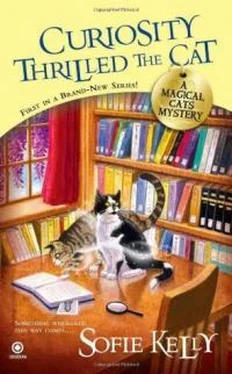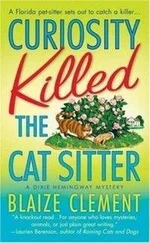There were no houses on this stretch of the road, just trees, huge, old trees. Except for the asphalt, it probably didn’t look much different from how it had when Everett’s mother was alive.
“How long has Wisteria Hill been abandoned?” I asked.
“Years,” Roma said, driving around the remains of a dead skunk and closing up her window at the same time. “Must be close to twenty-five.”
I stared at her, incredulous. “Twenty-five years? But why? Why would Everett let his home deteriorate for twenty-five years?”
“That’s the question, isn’t it?” Roma slowed and put on her blinker for the turn into the lane out to the old house. “To be fair, the place wasn’t really abandoned in the beginning.”
I put a hand on the dash as we bounced over the rutted dirt drive. “Everett closed the house after his mother died, didn’t he?” I asked.
“Yes, he did,” Roma said. “He closed off all but one section at the back. He had a caretaker who lived in it and took care of things, and, I’m guessing, looked after the cats.”
We pulled into a open area then, in front of the house, and I couldn’t help staring, just the way I had the first time I’d stumbled on the estate in the spring. The old house looked neglected. It looked . . . lonely. The windows had been boarded over. The right end of the verandah sagged. The yard was even more of a tangle of overgrown grass and weeds, prickly rosebushes, and saplings about kneehigh, new trees taking root as the forest slowly spread out. I thought about the remnants of the English country garden in the backyard. Someone had clearly cared about Wisteria Hill at one time. “What happened?” I said softly. “How could . . .” I let the end of the sentence trail off.
Roma sighed. “I truly don’t know. No one does.” She studied the house. “George and Clara Anderson took care of the place. They’re related to Everett’s secretary, Lita, somehow. Then they decided they wanted to move to Michigan to be closer to their daughter and grandkids. It was before I came back, but not by a lot.”
She reached into the backseat for her ball cap and pulled it on. “Everett spent most of his time in Minneapolis and just came home for weekends. When George and Clara left everyone thought he’d hire someone new. But he didn’t. He moved his business and himself back here, but he left the house empty. If he even comes out here, no one’s seen him.”
“How could Everett leave the cats out here to fend for themselves?” It was clear to me that Everett was an intense, hardheaded businessman, but I would never have said he was cruel.
“He didn’t,” Roma said. “No one knew there were any cats out here.” She reached over the seat again, this time for a dark canvas backpack. Then she opened the car door and got out. So did I. She glanced over at the house, then looked at me over the roof of the car. “The Andersons took four cats with them when they moved. Clara was the kind of person who would carry a bug outside rather than squish it.”
Like Ami, I thought.
“She wouldn’t have left a cat behind. Second week I was back here someone brought in an injured cat—attacked by something, probably a coyote. It was Desmond.” Roma popped the trunk.
“I didn’t know Desmond was feral,” I said, as I helped her take two large animal cages and a couple of blankets out of the trunk.
“What? Did you think he was just cranky?” Roma said, giving me a sideways grin.
“I didn’t even think he was cranky.”
Desmond was Roma’s cat. Or, more accurately, he was the animal clinic’s version of a guard dog. Sleek and black, Desmond had only one eye and was missing part of an ear. Even though he wasn’t a particularly big cat, his appearance and his demeanor made him seem larger and decidedly imposing. I’d seen him glare a barking golden retriever under a clinic chair. But he’d also sat companionably beside me in the waiting room while Owen and Hercules were being neutered.
“It never occurred to me that Desmond was a Wisteria Hill cat.”
Roma tucked the blankets under one arm and picked up one of the cages with her other hand. I grabbed the remaining cage. She started for the house and I followed.
“Des was almost full-grown when Marcus brought him in. He’s learned to tolerate people, but he hasn’t gotten close to anyone—not the way Hercules and Owen are close to you, although he does seem to like you better than pretty much anyone else.”
I stopped. “Marcus?”
Roma looked back over her shoulder. “Uh-huh. Marcus Gordon. The detective who’s working on the Easton case.” She started around the house to the backyard and I hurried to catch up with her. “Even hurt, Desmond was wild,” she continued. “He clawed the back of both of Marcus’s hands and caught the side of his face, as well.” She smiled. “You weren’t my first two-legged patient, Kathleen.”
Using her elbow to push a clump of blackberry canes out of her way, she gestured for me to go around her. “That encounter with Desmond would have put anyone else off of cats,” Roma said. “But not Marcus. In fact, he’s the helper who had to cancel today.”
Roma set down the cage she’d been carrying just in front of a large outbuilding. It was bigger than a garage, but not quite as large as a barn.
“What was this building?” I asked. “It’s too small to have been a barn.”
“It was the carriage house. Now it’s where the cats live.” She took the backpack from me, set it on the grass and opened the top.
“What happens in the wintertime?”
Roma pulled out a couple of sections of newspaper and set them on top of one of the cages. “We take care of the cats all winter, just the way we do the rest of the year.” She stood up and looked around the unkempt yard. “It took six weeks before I’d figured out how many cats there were in the colony. There were nine—a tom, three females and five kittens. It took four attempts to collect them all for neutering.”
“I don’t understand why you brought them back here.” I was already sweating a bit in my long pants and sleeves.
“Because they’re feral,” Roma said. “They’re not used to people and they don’t adapt well to living with them.” She held up a hand. “I know, I know. Owen and Hercules are different and I can’t completely explain that. In fact, I’m not even sure they were part of this colony. And as for Desmond, I don’t think he was feral. I think he was someone’s pet that was abandoned.”
“Is there a difference?”
Roma nodded. “An abandoned cat—a stray—will eventually form a relationship with you if you start feeding it. A feral cat will learn to trust you and depend on you if you feed it, but it will always be skittish.”
Roma crouched down and began to fold the newspaper so it would fit on the bottom of the two cages. “With caretakers the cats do quite well in the colony—the family—that they’ve formed.”
I bent beside her and took the other section of newspaper, folding it the way she had. “What do you mean by ‘caretakers’?”
“Pretty much what it sounds like,” she said. “Like I said, we trapped and neutered all the cats and made sure they were healthy. Of the original nine, one was too ill to return here and one of the kittens died several months later.”
“So there are seven cats now.” I set the folded paper on the bottom of the cage the way Roma had done with hers.
“That’s right. We have a feeding station set up. Volunteers come out once a day to feed the cats. In the wintertime Harry keeps the road plowed.” She brushed off her hands and stood up. I did the same.
“How do the cats stay warm all winter?” I asked.
“We have shelters for them—cat houses, if you will. They’re made from plastic storage bins, insulated and with straw inside for warmth. Rebecca built three of them for us.”
Читать дальше












